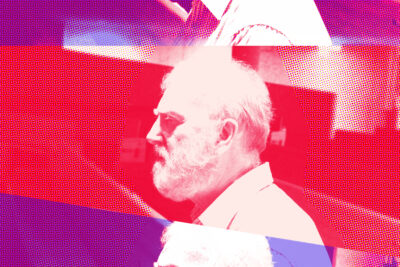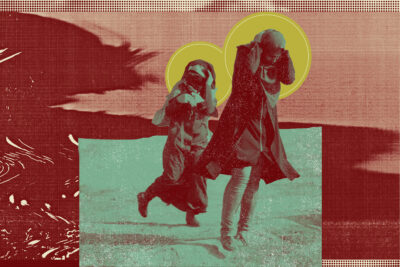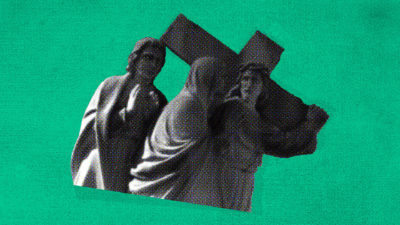The following is an extract from ‘Why the Cross: Understanding the Shape of the Christian Life’, now republished by our partner imprint, Lab/ora Press. Fr Donald Senior, a Passionist priest based in Chicago, was one of Catholicism’s leading New Testament scholars, up until his death in late 2022. Passionists’ media co-ordinator Chris Donald worked with Don in editing this new edition of the book.
The cross is the defining image of Christianity. The cross by itself, or as a crucifix with a depiction of the body of Christ fastened to it, is found in countless places: mounted on church steeples, embroidered on sacred vestments, attached to the walls of homes and institutions, tattooed on the hands of Coptic monks, fashioned into jewelry worn by believers as a symbol of their faith and by others as merely as an exotic necklace or earring.
When Christianity was becoming more well established in the Roman Empire, from the fourth century on, the cross began to appear everywhere as a sign of Christian faith. Byzantine churches would ultimately take on a cruciform design. In Byzantine art, such as frescos, mosaics, and icons, the cross is an ever-present symbol. The characteristic and universal Christian symbol of the cross has remained a consistent trademark throughout the centuries into our own day.
Asking ‘why the cross?’ also asks how innocent suffering fits with belief in a God of love. These are serious and difficult questions; and some traditional Christian answers become part of the problem.
The Scandal of the Cross
The cross, both as a sign of human suffering and as a positive sign of blessing and redemption, raises searing questions for Christian belief. Answering the question “Why the cross?” means not only explaining the historical context that led to the crucifixion of Jesus of Nazareth, but also understanding how the cross in Christian tradition symbolizes various forms of human suffering, past and present. Therefore, the question “Why the cross?” also asks how the reality of human suffering, particularly innocent suffering, fits with Christian belief in a God of love, compassion, and justice. These are serious and difficult questions and, in fact, some traditional Christian answers to these questions themselves become part of the problem.
One might note two fundamental meanings given to the cross based on two characteristic Christian expressions. One is the call to “bear the cross” and the other is “to take up the cross and follow me.” Like Simon of Cyrene in the gospel passion accounts, we can be asked to bear a cross we did not choose: a serious illness, the loss of a loved one, failure of a marriage, loss of a job. These sufferings come without invitation and often without warning. And yet traditional Christian wisdom affirms that we are asked “to bear the cross”; to suffer in the spirit of Christ without bitterness or complaint, and, in so doing, we are purified.
By contrast, the gospel saying “to take up the cross” implies an intentional and active commitment to follow Christ, including embracing the possibility of rejection and suffering, and even death itself, for the sake of the gospel. Thus “taking up the cross” becomes a way of expressing Christian discipleship and mission undertaken in a deliberate and challenging manner.
One of the most difficult questions the cross of Jesus raises is the issue of innocent suffering. By all accounts Jesus of Nazareth was a “just” man, innocent of the crimes with which he was charged. Yet his innocence did not protect him from terrible suffering—an unjust arrest, interrogation and torture, and death by crucifixion. The fundamental Christian conviction that Jesus was not only innocent but was, in fact, the Son of God, the most noble and sacred human being ever conceived, one whose life was without sin, who embodied the very being of God—this profound faith only makes the question of why Jesus had to suffer more acute. Jesus’ final words from the cross, the opening verse of Psalm 22 quoted in both the Gospels of Matthew and Mark, seem to make this very point: “My God, my God, why have you forsaken me?” (Matt 27:46; Mark 15:34).
It is a lament expressed on the lips of parents and spouses and siblings learning of the death of a loved one. It is the question that rises in the throats of anyone who has witnessed the horror of a crime scene or viewed the devastation of a suicide bombing or stood at the bedside of a desperately ill child. It is the devastating question raised by the genocide of six million Jews in World War II. How do we reconcile belief in a loving God with the reality of human suffering, particularly innocent suffering? This is a question that the biblical peoples themselves struggled with, from the anguish of Job to the Wisdom of Solomon’s wrestling with the suffering of the just man.
Most fundamental of all, Christian faith affirms that the cross of Christ, linked essentially with his resurrection, is a source of redemption and new life. Through the cross of Christ sin is forgiven and the world is reconciled to God—these are deep convictions of the New Testament and consequently of orthodox Christian faith. But here, too, the cross remains an enigma. How exactly does the death of Jesus free us from sin and secure our redemption? What exactly is “saving” about such a hideous form of human suffering and ignominious death? What difference did the death of Jesus on the cross really make? If, as Christian faith also affirms, Jesus Christ is the Word of God incarnate, and if his becoming human revealed God’s love for the world and gave humanity a new dignity and even a divine character, why was it necessary for Jesus to also have to suffer and die in order to effect our salvation?
These questions are all the more serious because they are being raised not by persons hostile to Christianity, but by sincere believers who are grappling with the meaning of the cross as a fundamental reality of Christian faith.
The use of the cross as a symbol for Christian experience and discipleship raises another set of questions, one posed in particular by feminist and womanist theologians. Does the notion of “bearing the cross” imply a kind of passive and subservient acceptance of suffering, particularly of suffering imposed by oppressive and unjust structures and systems? Do such traditional exhortations to “bear the cross,” particularly when stated by a patriarchal authority structure in relationship to women’s aspirations, make the cross a blunt instrument to keep women “in their place” and to encourage submission and conformity? Have some aspects of traditional piety built around the bearing of the cross and the sufferings of the cross been used to encourage African Americans and other oppressed groups to accept their fate and not redress their rights? Furthermore, does the focus on the silent and uncomplaining bearing the cross of suffering often recommended to persons with disabilities and persons with various forms of illness become a code word that encourages passivity and discourages courageous action demanding access and justice?
In general, does the focus on the cross give Christianity a fundamentally morbid and negative aura? Is not Christian faith rather a celebration of abundant life? Does not piety and devotion focused on the passion of Jesus and his death on the cross rob Christianity of its fundamental vibrancy and proclaim not a God of life and love but a God who exacts death to atone for human sinfulness? Does not the focus of traditional Christian theology on the redemptive death of Jesus isolate the meaning of the cross from the overall mission of Jesus as presented in the Gospels, a mission whose keynote was the advent of God’s kingdom where suffering and death would be replaced by healing and abundant life? Is not then the theology of the cross ultimately a distortion of the good news proclaimed by Christ?
These are serious questions that reach to the heart of Christian faith. And they are all the more serious because they are being raised not by persons hostile to Christianity but by sincere believers who are grappling with the meaning of the cross as a fundamental reality of Christian faith. The study we are about to embark on does not pretend to adequately answer all of these gripping questions. Many of these questions demand an ongoing strong theological and ethical reflection on the part of the church, and the answers may vary from culture to culture and from age to age.
But what this study can do is to examine in some detail the role and meaning of the cross in the writings of the New Testament. It is here, in this biblical witness, that the church’s subsequent theological reflection and the practices of its piety must find their root. There is no single or uniform New Testament perspective on the meaning of the cross, but a rich diversity of perspective and tone. At the same time, every facet of the New Testament reflections on the meaning of the cross takes its starting point and finds its anchor in the fact that Jesus of Nazareth, Son of God and Messiah, incarnate Word and Savior of the world, died on a cross. No serious student of history, whatever one’s estimation of the New Testament or the figure of Jesus himself, could doubt that Jesus of Nazareth was crucified.
By helping the reader encounter the beauty and power of the New Testament’s reflection on the cross, I hope that the meaning of this profound Christian symbol will become clearer and a more satisfying answer can be given to the question, “Why the cross?”
Why the Cross: Understanding the Shape of the Christian Life is available now from the bookstores below (and elsewhere):
Paperback: Waterstones | Blackwells | Foyles
eBook: Kindle Store (others coming soon)
Related Stories

Inner State: Passionist Life in North Belfast
North Belfast is a community that has seen immense trauma over the past century – defined by political forces beyond its control.
May 30 2024

To Illumine the Mind: the Catholic diaspora in Paris
In Paris, Martin Coffey leads a church overflowing with working class immigrants. The picture of religion in France, he tells us, is not what you think.
Mar 01 2024

Stations of the Cross in Palestine
In Passionist spirituality, the Stations of the Cross are a journey transcending time: repeating in everyday suffering, especially now in Gaza.
Jan 25 2024

